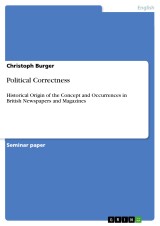Details

Political Correctness
Historical Origin of the Concept and Occurrences in British Newspapers and Magazines1. Auflage
|
13,99 € |
|
| Verlag: | Grin Verlag |
| Format: | |
| Veröffentl.: | 16.12.2008 |
| ISBN/EAN: | 9783640232161 |
| Sprache: | englisch |
| Anzahl Seiten: | 14 |
Dieses eBook erhalten Sie ohne Kopierschutz.
Beschreibungen
Seminar paper from the year 2005 in the subject English Language and Literature Studies - Other, grade: 1, University of Vienna (Institut für Anglistik/Amerikanistik), language: English, abstract: In this paper I will discuss the concept and the historical origin of political correctness in America and how it managed its way to Great Britain. The discussion will be followed by a section, describing my own research. The main purpose of this investigation is to determine if "political correctness" exists in Great Britain and if there are differences between newspapers and magazines.
In 1990 and 1991 the political correctness debates started in the USA. These debates received great attention in the media as a series of articles in Newsweek, U.S. News and World Report, the New York Times, Time, the Village Voice, and Atlantic Monthly was written. It was also featured in numerous magazine covers and nationwide talk shows on TV. (c.f. Calhoun 2001: 1337). Due to this great popularity it has been a "'household word' in Anglophone North America since the early 1990" (Auer 2004: 3). Nonetheless it is very hard to define.
The terms "politically correct" and "political correctness" came from the Left movement, where it was used ironically to describe people who were too orthodox. Now it is often used by the Right to describe the Left. Its meaning has also been blurred by the mass media. The stems of the concept are most likely situated in the social movement culture of the late sixties. Important movements are "The American Civil Rights movement", "The Women's Liberation" and "The Gay and Lesbian Liberation". Political correctness came to Great Britain shortly after it boomed in the US. Its development was similar, but on a much lower scale.
My own research showed that there were more occurrences of words with a –man suffix in newspapers than in magazines. The most surprising fact was, that there was not even one word with the suffix –person. I had to restrict research area to the suffixes of –man, –woman and –person, otherwise it would have gone beyond the scope of my paper.
Keywords: political correctness, politische Korrektheit, Diskriminierung, Vorurteile,
In 1990 and 1991 the political correctness debates started in the USA. These debates received great attention in the media as a series of articles in Newsweek, U.S. News and World Report, the New York Times, Time, the Village Voice, and Atlantic Monthly was written. It was also featured in numerous magazine covers and nationwide talk shows on TV. (c.f. Calhoun 2001: 1337). Due to this great popularity it has been a "'household word' in Anglophone North America since the early 1990" (Auer 2004: 3). Nonetheless it is very hard to define.
The terms "politically correct" and "political correctness" came from the Left movement, where it was used ironically to describe people who were too orthodox. Now it is often used by the Right to describe the Left. Its meaning has also been blurred by the mass media. The stems of the concept are most likely situated in the social movement culture of the late sixties. Important movements are "The American Civil Rights movement", "The Women's Liberation" and "The Gay and Lesbian Liberation". Political correctness came to Great Britain shortly after it boomed in the US. Its development was similar, but on a much lower scale.
My own research showed that there were more occurrences of words with a –man suffix in newspapers than in magazines. The most surprising fact was, that there was not even one word with the suffix –person. I had to restrict research area to the suffixes of –man, –woman and –person, otherwise it would have gone beyond the scope of my paper.
Keywords: political correctness, politische Korrektheit, Diskriminierung, Vorurteile,

















